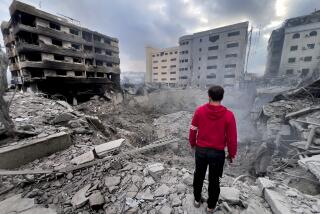In a Lebanon camp, Palestinian viewpoints on conflict diverge
THE SHATILA REFUGEE CAMP, LEBANON — It was time to close up. And that meant everybody.
“But we want to work,” one shopkeeper pleaded with the brawny young man with an assault rifle, among the gunmen ordering businesses to pull down their metal shutters before the big demonstration.
The shopkeeper’s pleas were in vain. One by one, as the 3 p.m. hour of the protest approached on Monday, he and others in this squalid camp padlocked their shops in sometimes grudging solidarity with their fellow Palestinians facing Israel’s armed forces.
“We are sad and full of sympathy,” said Ahmad Najjar, a 23-year-old Palestinian carpenter born and raised in the Shatila camp. “I feel fire and anger. I would be ready to fight against Israel. But we can’t do much. We just trust in God.”
Perhaps nowhere in the Middle East has the Israeli offensive in the Gaza Strip reverberated more powerfully and divisively than in the Palestinian refugee camps scattered across the region. As they watch fellow Palestinians die under Israeli fire in Gaza, their frustrations have once again come to the fore.
Nowhere is the inchoate rage laced with futility, much of it directed at Israel and pro-Western Arab governments like Egypt and Jordan, greater than in the camps. Over the last week, Palestinians in the camps marched in the streets and burned tires in occasionally rowdy confrontations with security forces.
“They’re angry and they’re holding protests inside the camps and outside the camps,” said Hoda Turk, a spokeswoman for the United Nations Relief and Works Agency, which oversees the camps. “There is tension inside the camps because they are watching the news and their brothers in Gaza are suffering.”
But beyond the anger, barely papered-over cracks are emerging. The camps are extensions of the traumas, dilemmas and political differences playing out in the Palestinian territories, with the same tensions between Islamists and secularists, between the Western-backed Fatah faction and the Iranian-backed Hamas movement, between those tired of politics and those who remain steadfastly committed to the national cause.
Though all are furious with Israel and its backers in Washington, they differ on who gets the rest of the blame for the violence enveloping Gaza. Some refugees blame the moderate Arab governments in Egypt and Jordan, the latter a host country for Palestinian refugees, which have signed peace treaties with Israel. Cairo maintains a blockade on Gaza.
“These regimes play the same role as Israel,” said Mahmoud Maari, an official of the Shatila branch of Fatah Intifada, one of a kaleidoscope of Palestinian political groups that lord it over the various camps. “They try to deny our people our humanity by forcing us to accept humiliating compromises.”
Others say Gaza’s Islamic factions behaved recklessly, provoking Israel into destroying nearly 15 years’ worth of public infrastructure built up in the coastal enclave under the late Yasser Arafat.
Beyond the universal condemnation of Israel, “people have different opinions,” said Bassam Jamil Hubeichi, a Palestinian activist in Lebanon. “Some of them say Egypt is responsible and they should open the borders. Others say Hamas is responsible and they should keep a lower profile.”
But whether they support Fatah’s diplomatic approach or Hamas’ militaristic stance, Palestinians say they feel despondent.
“If you make peace with Israel, you are a loser,” said Hubeichi. “If you make war, you are a loser.”
About 4.6 million U.N.-registered Palestinian refugees -- those who fled what is now Israel and their descendants -- live in the Middle East. They include about 700,000 concentrated in dozens of densely populated camps scattered across Lebanon, Syria and Jordan.
Over the last 60 years, the camps have grown from temporary settlements into densely packed slums filled with six-story apartment buildings, where crumpled sedans navigate trash-filled craters along rutted roadways and utility cables are strung haphazardly across narrow alleyways.
Shatila, along with the adjacent Beirut neighborhood of Sabra, was the site of an infamous 1982 massacre of Palestinians by a Christian militia allied with Israel, which had its occupation troops surrounding the camp at the time of the killings.
“The people in Gaza are our blood,” said Abdul Latif Abed, a beefy 40-year-old proprietor of a sandwich shop in Shatila who said he lost relatives in the 1982 violence.
“When they suffer, we suffer.”
He said he closes up shop early and dutifully heads to demonstrations whenever asked. “We hope there’s something we could do, but . . . ,” he said, his sentence trailing off.
“We can burn tires. We can demonstrate,” he continued. “But concretely, there is nothing we can do.”
--
More to Read
Sign up for Essential California
The most important California stories and recommendations in your inbox every morning.
You may occasionally receive promotional content from the Los Angeles Times.










